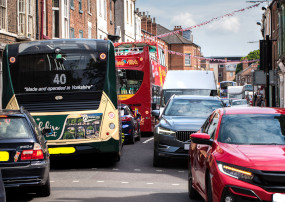
A trial that seeks to improve air quality on Gillygate will start this week.
From 2 January 2025 the council will trial changes to the traffic light sequencing to significantly reduce stationary traffic on the street which has the worst air quality in York.
Queueing motor vehicle traffic emits gases such as nitrogen oxides and particulate matter that negatively affect air quality and in turn negatively impact the health of residents and visitors in those areas. Narrow streets with buildings on either side create a canyon effect, where pollution from queuing vehicle traffic becomes trapped, leading to poor air quality. Reducing queuing traffic on Gillygate should improve air quality on the street.
The trial is for 12 months to ensure that the air quality data can be effectively compared with previous years, and it will be monitored and adapted if there are major issues. This will include reviewing the impact on buses and emergency vehicles. Should they be needed, adjustments to the timings would be made during the trial to seek to minimise any impacts on these groups.
Councillor Kate Ravilious, Executive Member for Transport said:
Working alongside the Gillygate community and the York Civic Trust we are taking action to tackle pollution in the area.
“Queueing traffic on this street makes a significant contribution to the poor air quality. It also creates an unpleasant environment and discourages people from walking, wheeling, cycling and visiting the street. The canyon like shape of the street worsens the problem and means polluted air is trapped for longer than on other streets.
“I want to thank everyone who has made this trial possible. We all want to better understand the impacts of these changes and ultimately find a long-term solution that improves air quality. Achieving this would bring health and economic benefits and help us to deliver on the Local Transport Strategy priorities that York is a healthier, more sustainable and better-connected city.”
Councillor Jenny Kent, Executive Member for Environment and Climate Emergency said:
Air quality in Gillygate has been a challenge for a long time and despite recent reductions in air pollution it still breaches national standards. Residents are rightly concerned, and this trial is a step towards addressing the problem.
"We hope it will bring benefits to people’s health, local businesses, and the environment. In time, this trial will also help us to look at other locations across York experiencing poor air quality or disruption as a result of queueing traffic."
A spokesperson for the Gillygate Air Quality Action Group said:
We welcome and support the council's trial in Gillygate as it focuses attention on the environmental issues faced each day by residents, businesses, motorists and pedestrians.
The outcomes of the trial should help to inform the search for more permanent solutions to these issues.
“We aim to ensure that all residents and businesses in the Gillygate area have the opportunity to input into the council's thinking about what these solutions may look like."
Tony May, chair of York Civic Trust’s Environment Committee, said:
Gillygate has air pollution levels which have exceeded government thresholds for many years, and it is clear that much of that pollution is caused by traffic. We are pleased to have been able to support the Gillygate Area Air Quality Action Group, and the Council, in developing this trial and in designing the proposed surveys.
"We look forward to seeing the early results from the trial, which we hope will be an exemplar for what can be achieved across the city through the Council’s Movement and Place Plan."
In 2023 there was a 2-week trial. This was successful in reducing queueing traffic on Gillygate, but there were some concerns around longer traffic queues on Lord Mayor’s Walk, and to a lesser extent, Clarence Street. The findings and timings from 2023 will be used to shape this latest trial in the area. In addition, over the longer term, any increased traffic queues on surrounding streets are anticipated to dissipate, as people adapt how they travel.
This trial will look to ensure traffic will access Gillygate and flow through it with minimal stopping.


